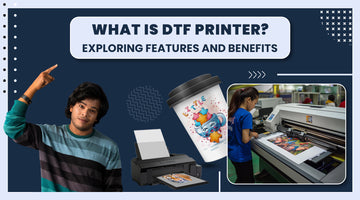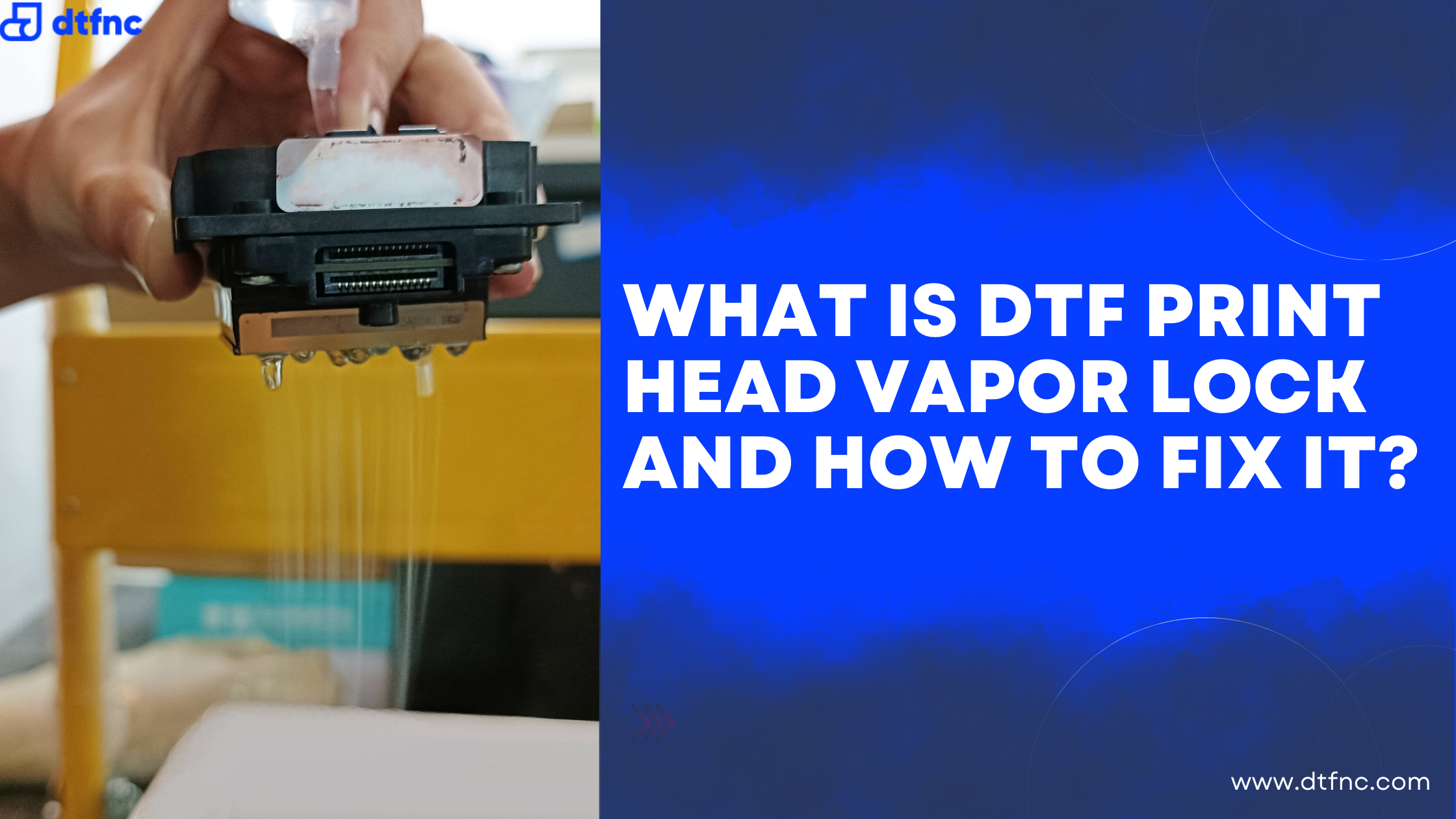If you’ve ever dreamed of printing vibrant, long-lasting designs on everything from cotton tees to polyester hoodies, welcome to the magic of DTF printing! But before you dive in, there’s one big question: what printer is used for DTF?
Choosing the right DTF printer can feel like picking the perfect things for yourself—some are high-maintenance, some are budget-friendly, and some are just built to perform. Whether you're searching for the best DTF printers for high-quality transfers or need an affordable DTF printer that won’t break the bank, we’ve got you covered.
Let’s find the perfect DTF transfer printer to bring your designs to life—without any buyer’s remorse
Understanding DTF Printing Technology
DTF (Direct-to-Film) printing is changing the game in custom apparel, allowing for high-quality DTF transfers with incredible color vibrancy on a variety of fabrics. But how does it work? Unlike traditional printing methods, printers for DTF printing use specialized ink and a unique transfer process to produce long-lasting designs.
At the heart of this process are White Ink DTF printers, which ensure that even the most colorful designs pop on dark fabrics. However, to get the best results, DTF ink and film compatibility is key—using the right combination ensures smooth application and durability.
Whether you’re looking for the best DTF printer for small business startups or the best DTF printer for large-scale production, understanding the technology behind DTF will help you make an informed decision.
Types of Printers Used for DTF Printing

If you're wondering what printer is used for DTF, the answer depends on your needs and budget. Direct-to-Film (DTF) printing requires specialized printers that can handle inkjet inks and produce high-quality prints on transfer films.
1. Epson Printers for DTF Printing
Epson printers for DTF printing are widely used due to their adaptability and print quality. Many small businesses modify Epson inkjet printers to make them suitable for DTF with white ink and RIP software.
2. Cheapest DTF Printers and Economical Options
A cheapest DTF printer is ideal for startups or small-scale production. Converted Epson models provide an economical DTF printer option with a balance of affordability and performance.
3. Dedicated DTF Printers for Small Businesses
A DTF printer for small businesses should be cost-effective and easy to use. Compact DTF printers are great for beginners printing DTF transfers for shirts and accessories.
4. White Ink DTF Printers
White ink DTF printers are essential for printing on dark fabrics. They add an opaque white layer, ensuring vibrant high-quality prints on various materials.
5. Best Commercial DTF Printers
The best commercial DTF printers are designed for high-volume production. These machines include automated white ink DTF printers for speed and efficiency.
6. Inkjet Printers Modified for DTF Printing
Businesses often modify inkjet printers with DTF-compatible inkjet inks. This budget-friendly method makes standard printers suitable for DTF printing.
7. Large-Format DTF Printers for High Production
Large-scale businesses use large-format DTF printers for bulk orders. These printers produce high-quality prints quickly, making them ideal for mass DTF printer for shirts production.
Key Features to Look for in a DTF Printer
Let's look into what features should a DTF printer have:
-
Ensure the DTF printer is compatible with DTF-specific ink or DTF inks. Using the right inks prevents clogs and ensures durable prints, especially on various fabric types.
-
A good printer model should be built to last with minimal maintenance. Look for a DTF printer that is easy to clean and requires less frequent servicing to ensure long-term reliability.
-
The best DTF printer models are user-friendly, making setup and operation straightforward. Look for a printer that simplifies the process so you can focus on your designs without technical difficulties.
-
And more.
Also Read: DTF Transfer Printing vs Other Methods
DTF Printer Maintenance: Tips for Longevity and Performance
When deciding what printer is used for DTF, it's important to select a printer that’s user-friendly and designed for DTF transfers. Whether you're using a DTF printer or a UV DTF printer, regular maintenance ensures optimal performance and vibrant prints.
1. Use the Right Ink
Always use high-quality DTF inks designed specifically for DTF printers. Using the wrong ink can cause print quality issues and damage the printer. Ensure the ink is compatible with your chosen printer model for the best results.
2. Proper Storage
Store your DTF transfer printer in a clean, dry area to prevent dust and debris from entering the printer. Keeping your printer in optimal conditions helps prolong its lifespan.
3. Check for Software Updates
Ensure that your printer's software is up to date. This will optimize performance, enhance print quality, and ensure compatibility with the latest DTF inks.
Common Issues with DTF Printers and How to Fix Them

1. Clogged Printheads
Clogged printheads are a common issue in DTF transfer printers. To fix this, clean the printhead using a cleaning solution specifically designed for inkjet printers. Regular maintenance can prevent clogs and ensure continuous printing.
2. Poor Print Quality
When prints come out blurry or faint, it's often due to incorrect settings or low-quality inks. Ensure your printer is set to print at 1440 dpi for high-quality prints. Also, check that you are using the right DTF transfer films to achieve vibrant colors.
3. Inconsistent Ink Distribution
Sometimes, DTF transfer printer results may show inconsistent ink application, especially if the printer isn’t suitable for DTF. To fix this, ensure your printer is calibrated correctly and use inkjet inks designed specifically for DTF transfer printing.
4. Issues with Film Adhesion
If the transfer film doesn't adhere properly to the fabric, it may be due to poor-quality films or incorrect heat settings. Ensure you're using high-quality DTF transfer films and adjust the temperature to match the fabric type.
Conclusion
Choosing the right printer for DTF printing is essential to achieving vibrant, durable, and high-quality results. With the right equipment, you can ensure your DTF transfer prints stand out, providing long-lasting designs that meet your business needs.
At DTFNC, we’ve redefined the DTF printing industry by focusing on superior quality, precision, and customer satisfaction. Ready to improve your prints? Join us and experience the difference passion and precision make!
FAQs
Q: What printer do I need for DTF transfers?
For DTF transfers, you need a DTF printer for shirts that supports inkjet inks and can handle white ink DTF printers. Epson printers for DTF printing are a popular choice, modified for high-quality prints.
Q: Can I print DTF with any printer?
No, you can't print DTF with any printer. You need a printer that is either a DTF printer for shirts or one that can be modified, like Epson printers for DTF printing, and uses inkjet inks.
Q: Can you print DTF on Epson printer?
Yes, you can print DTF on Epson printers for DTF printing. Many businesses modify Epson inkjet printers to be suitable for DTF, using white ink DTF printers and specialized software.
Q: What is required for DTF printing?
To print DTF, you need a printer for DTF transfers, like an Epson inkjet printer or a dedicated DTF printer. You also need DTF transfer films, specialized inkjet inks, and white ink.
Q: Can I print DTF without software?
No, you cannot print DTF without software. DTF printers require RIP software for proper color management and white ink DTF printers for dark fabric printing. The software ensures high-quality prints.
Also, read more related blogs here.









8 comments
📦 Email: Process 1,836418 BTC. Withdraw >>> https://graph.org/Message--0484-03-25?hs=f64da4e19f0a1e4c1125f13a645b7b50& 📦
3pl8vf
🔑 Reminder- TRANSFER 1.375607 BTC. Verify =>> https://graph.org/Message--685-03-25?hs=f64da4e19f0a1e4c1125f13a645b7b50& 🔑
ldz6oh
🛠 + 1.348541 BTC.GET - https://graph.org/Message--17856-03-25?hs=f64da4e19f0a1e4c1125f13a645b7b50& 🛠
vmo4z0
✂ Reminder: Process 1,544605 BTC. Continue =>> https://graph.org/Binance-04-15?hs=f64da4e19f0a1e4c1125f13a645b7b50& ✂
annxd9
🔍 + 1.560950 BTC.GET - https://graph.org/Message--0484-03-25?hs=f64da4e19f0a1e4c1125f13a645b7b50& 🔍
96d97z